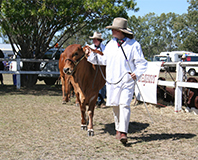Read the latest information on
Foot-and-mouth disease
 With Easter right around the corner, preparations for one of Australia’s biggest agricultural shows – the Sydney Royal Easter Show – are in full swing.
With Easter right around the corner, preparations for one of Australia’s biggest agricultural shows – the Sydney Royal Easter Show – are in full swing.
Agricultural shows have a long and proud tradition throughout the country and come in all shapes and sizes. Some exist as an annual event for their local community, while others draw in crowds from across vast areas and even interstate.
“Whilst shows can present a significant risk to animal health due to stock movements and animals being kept in close quarters, there are a few simple steps you can follow to mitigate the risks”, said Dr Rob Barwell, Senior Manager Biosecurity at Animal Health Australia.
“You should make sure that you’re following the show’s procedures for managing animal health. Many shows will ask for an Animal Health Declaration, which contains information on the disease status of the animals, any test results and vaccinations that they have received. Some shows will have additional animal health requirements to what is on the Animal Health Declarations.”
Another is to keep animals segregated, maintain your own supplies of feed and water where possible, and not let animals graze on any grass at the venue.
“This will greatly reduce the likelihood of exposure to diseases or weed seeds,” said Dr Barwell.
When transporting livestock to and from the show, ensuring the animal is not sick or injured is essential to both biosecurity and animal welfare.
“As with any consignment, making sure that the animals heading to the show are able to stand and walk and are not showing clinical symptoms will ensure they’re fit to travel and help to prevent the spread of disease,” says Dr Barwell.
“Also ensure that the show itself has a procedure for identifying and excluding sick animals from the grounds.”
Make sure you’re also complying with any relevant legislation when moving animals, especially if travelling interstate. Each state has their own rules and regulations for animal movements, including recording requirements, which may or may not affect shows and events.
Lastly, when returning home, isolating animals in a holding yard or paddock will allow any weed seeds to pass through the animal and will give time for any symptoms of disease to become apparent. Monitor the returning animals for illness and their yard or paddock closely for new weeds and treat as needed.
Showing animals is a real joy, but may pose a risk. These risks can be easily managed with some preparation. Each of these simple actions will help to protect the health of your animals, and secure your farm against diseases, pests and weeds when livestock return from the show.
Producers wanting to know more about protecting their farm can explore the six essentials on the Farm Biosecurity website